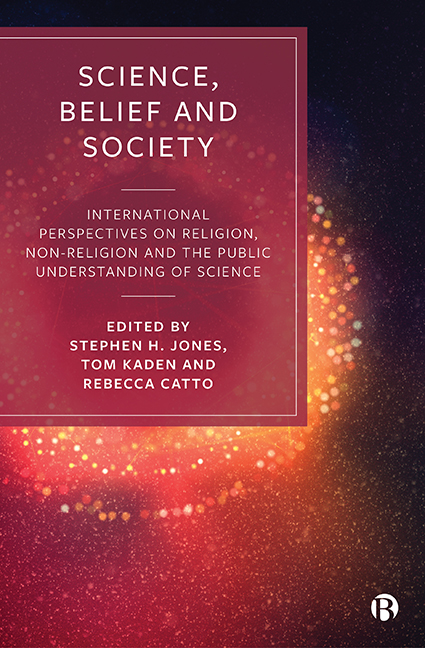 Science, Belief and Society
Science, Belief and Society Book contents
- Frontmatter
- Contents
- List of Figures and Tables
- Notes on Contributors
- Editors’ Acknowledgement
- Foreword
- Editors’ Introduction: Science, Belief and the Sociological Tradition
- PART I Methodological Challenges in the Study of Science and Belief
- PART II Belief in the Study of Science and Technology
- PART III Science, Culture and Non-religion
- PART IV Religion, Conflict and Moderation
- Conclusion: Future Directions in the Sociological Study of Science and Belief
- Index
8 - Feeling Rational: Affinity and Affinity Narratives in British Science–Non-religion Relations
Published online by Cambridge University Press: 27 April 2022
- Frontmatter
- Contents
- List of Figures and Tables
- Notes on Contributors
- Editors’ Acknowledgement
- Foreword
- Editors’ Introduction: Science, Belief and the Sociological Tradition
- PART I Methodological Challenges in the Study of Science and Belief
- PART II Belief in the Study of Science and Technology
- PART III Science, Culture and Non-religion
- PART IV Religion, Conflict and Moderation
- Conclusion: Future Directions in the Sociological Study of Science and Belief
- Index
Summary
Introduction
The idea that religion and science are opposed to one another has proved remarkably resilient, despite widespread, wide-ranging and often quite straightforward and easily graspable criticisms of its core premises. Given that the idea of science and religion as being intrinsically conflicting now seems naive, the question to ask is not ‘How are religion and science opposed to one another, if at all?’, but rather ‘What is the basis of this flawed idea of conflict and its hold over popular and scholarly imaginations?’. If the idea of a science–religion conflict is not based in reality, how and why does it persist as one of the central narratives about religion–science relations, and about modernity more generally?
The goal of this chapter is to consider this question from the perspective of non-religion and secularity studies (Bullivant and Lee, 2012), focusing, in particular, on the relationship between science and non-religiosity. These areas of study offer an important vantage point since the other side of the coin to the idea of science–religion conflict is the idea of science–non-religion affinity. It is therefore possible and potentially helpful to ask what role the latter idea plays in sustaining the popularity of the former.
This discussion builds on ideas arising from critical secular studies and critical religion studies, both of which challenge the idea that science mainly impacts on religion epistemically, and instead draw attention to the ideological and mythological roles that science plays in the subjectivities, identities and cultures of non-religious people. This work tends to be largely theoretical or to rely on very broad historical accounts of Western modernity in its entirety (Lee, 2019). The aim of this chapter is therefore to contribute to – and further encourage – the more localized and detailed empirical explorations of perceived non-religion–science affinity that are just beginning to emerge (see, eg, Kaden et al, 2017; see also Elsdon-Baker et al 2017).
The chapter uses the UK as a case study for understanding the role of science within non-religious cultural formations found more widely, especially across Europe and other Western regions. It returns to data from the ‘Being Secular’ research project (Lee, 2015), gathered primarily through in-depth interviews with people who said that they would prefer to identify as ‘non-religious’ than ‘religious’.
- Type
- Chapter
- Information
- Science, Belief and SocietyInternational Perspectives on Religion, Non-Religion and the Public Understanding of Science, pp. 173 - 196Publisher: Bristol University PressPrint publication year: 2019


